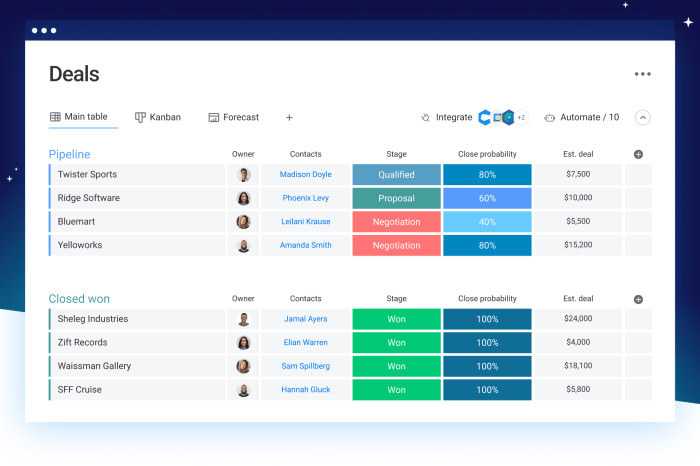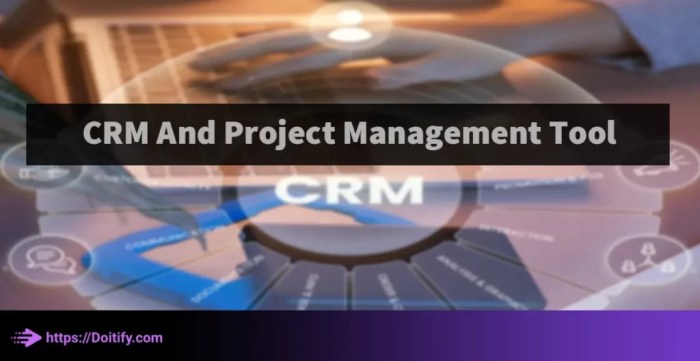Crm and project management software – In today’s dynamic business environment, efficient organization and streamlined workflows are paramount to success. This necessitates the use of robust software solutions that can manage both customer relationships and project execution effectively. This comprehensive guide delves into the intricacies of CRM (Customer Relationship Management) and project management software, exploring their individual functionalities, synergistic benefits when integrated, and how they contribute to overall business growth.
We’ll also cover key features, selection criteria, and address frequently asked questions.
Understanding Customer Relationship Management (CRM) Software: Crm And Project Management Software
CRM software is a centralized system designed to manage and analyze customer interactions and data throughout the customer lifecycle. From initial contact to post-sales support, a CRM system helps businesses understand their customers better, improve communication, and ultimately boost sales and customer loyalty. Key features typically include:
Core CRM Features:, Crm and project management software
- Contact Management: Storing and organizing customer information (name, contact details, purchase history, etc.).
- Sales Force Automation (SFA): Automating sales processes, tracking leads, managing opportunities, and forecasting sales.
- Marketing Automation: Automating marketing tasks like email campaigns, social media posting, and lead nurturing.
- Customer Service Management: Managing customer inquiries, resolving issues, and tracking support tickets.
- Reporting and Analytics: Generating reports and analyzing data to gain insights into customer behavior and sales performance. This often includes sales dashboards and KPI tracking.
- Integration Capabilities: Connecting with other business applications like email marketing platforms and accounting software.
Popular CRM platforms include Salesforce, HubSpot, Zoho CRM, and Microsoft Dynamics 365. The choice of CRM depends on business size, industry, and specific needs. Smaller businesses might opt for simpler, more affordable options, while larger enterprises may require more comprehensive and scalable solutions.
Understanding Project Management Software
Project management software facilitates the planning, execution, monitoring, and completion of projects. It provides tools for task assignment, progress tracking, resource allocation, and communication, ensuring projects stay on schedule and within budget. Key features include:
Core Project Management Features:
- Task Management: Creating, assigning, and tracking tasks within a project.
- Gantt Charts: Visualizing project timelines and dependencies.
- Kanban Boards: Managing workflows using a visual Kanban system.
- Resource Allocation: Assigning resources (people, equipment, budget) to tasks.
- Collaboration Tools: Facilitating communication and collaboration among team members.
- Time Tracking: Monitoring time spent on tasks and projects.
- Reporting and Analytics: Generating reports on project progress, budget, and resource utilization. This includes burn-down charts and other project metrics.
- Risk Management: Identifying and mitigating potential project risks.
Popular project management platforms include Asana, Trello, Monday.com, Jira, and Microsoft Project. The best choice depends on project complexity, team size, and preferred methodology (Agile, Waterfall, etc.).

Source: cloudinary.com
The Synergy of CRM and Project Management Software
While seemingly distinct, CRM and project management software can work synergistically to enhance business efficiency and profitability. Integrating these systems allows for seamless data flow between customer interactions and project execution. This integration offers several key advantages:
Benefits of Integration:
- Improved Customer Communication: Project updates and progress reports can be easily shared with clients via the CRM system, maintaining transparency and fostering strong relationships.
- Enhanced Project Planning: Customer data from the CRM (e.g., needs, preferences) can inform project planning, ensuring projects meet client expectations.
- Streamlined Workflows: Automating data transfer between systems eliminates manual data entry and reduces errors.
- Better Resource Allocation: Project management software can leverage CRM data to allocate resources effectively based on customer priorities and project needs.
- Improved Forecasting: Combining sales data from the CRM with project completion data allows for more accurate forecasting of revenue and profitability.
- Increased Customer Satisfaction: Efficient project execution and clear communication lead to higher customer satisfaction.
Choosing the Right Software: Key Considerations
Selecting the appropriate CRM and project management software requires careful consideration of several factors:
- Business Size and Needs: Small businesses may need simpler, more affordable options, while larger enterprises require scalable and feature-rich solutions.
- Industry-Specific Requirements: Certain industries have specific needs that require specialized software features.
- Integration Capabilities: Ensure the software integrates seamlessly with other business applications.
- User-Friendliness: Choose software that is easy to use and understand for all team members.
- Scalability: Select software that can grow with your business.
- Budget: Consider the cost of the software, including licensing fees, implementation costs, and ongoing maintenance.
- Customer Support: Ensure the vendor provides adequate customer support and documentation.
Frequently Asked Questions (FAQ)
- Q: Can I use separate CRM and project management software? A: Yes, many businesses successfully use separate systems. However, integrating them offers significant benefits.
- Q: What is the best CRM software for small businesses? A: HubSpot, Zoho CRM, and smaller versions of Salesforce are popular choices for small businesses.
- Q: What is the best project management software for Agile teams? A: Jira, Asana, and Trello are popular choices for Agile teams.
- Q: How much does CRM and project management software cost? A: Costs vary widely depending on the vendor, features, and number of users. Some offer free plans, while others charge monthly or annual subscriptions.
- Q: How long does it take to implement CRM and project management software? A: Implementation time varies depending on the complexity of the software and the size of the business. It can range from a few weeks to several months.
- Q: What are the key metrics to track when using CRM and project management software? A: Key metrics include customer acquisition cost (CAC), customer lifetime value (CLTV), project completion rate, and project profitability.
Conclusion
Effective CRM and project management software are essential tools for modern businesses seeking to optimize operations, enhance customer relationships, and drive growth. By carefully selecting and integrating the right systems, businesses can streamline workflows, improve communication, and ultimately achieve greater success. Consider your specific needs and explore the various options available to find the perfect fit for your organization.
References
Call to Action
Ready to optimize your business processes? Explore the leading CRM and project management software solutions today and discover how they can help you achieve your goals. Contact us for a free consultation!
Common Queries
What are the benefits of integrating CRM and project management software?

Source: doitify.com
Improved collaboration, streamlined workflows, better resource allocation, enhanced client satisfaction, increased profitability, and data-driven decision-making.
What are some examples of integrated CRM and project management software?
Many platforms offer integrated solutions, or integrations between separate CRM and project management systems. Examples include platforms like Zoho, HubSpot, and Microsoft Dynamics 365, though specific offerings vary.
How much does integrated CRM and project management software cost?
Pricing varies greatly depending on the features, scalability, and vendor. Expect a range from free plans with limited features to enterprise-level solutions with significant monthly or annual fees.
Is it difficult to implement integrated CRM and project management software?
Implementation complexity depends on the size and complexity of the business, the chosen software, and the level of existing system integration. Professional services are often recommended for larger organizations.
